Building an MVP is a race against time, and AI coding tools can make or break your process. I tested 20 popular tools to see which ones are worth your time and money. Here’s the quick summary:
- Best for Code Generation: GitHub Copilot and ChatGPT excel at generating boilerplate code and handling common programming tasks.
- Top Debugging Assistants: MutableAI and ChatGPT are great at spotting errors and suggesting fixes.
- Budget-Friendly Options: Codeium, CodeT5, and PolyCoder offer free or open-source solutions for startups.
- Specialized Tools: Amazon CodeWhisperer is ideal for AWS-heavy projects, while Replit AI is perfect for rapid prototyping in cloud-based IDEs.
- Legacy Tools: Kite and Codex were impactful but are no longer active.
Quick Comparison:
| Tool Name | Best For | Pricing | Integration | Key Limitation |
|---|---|---|---|---|
| GitHub Copilot | Code generation, IDE use | $10-$19/month | Works with VS Code, React, Python | Struggles with complex logic |
| ChatGPT | Conversational debugging | Free/$20+ per month | MEAN, MERN, JAMstack | Subtle errors in generated code |
| Tabnine | Predictive completions | Free/$12+ per month | VS Code, IntelliJ | Limited advanced debugging |
| Amazon CodeWhisperer | AWS-specific tasks | Free during preview | AWS IDEs, Python, Java | Pricing unclear post-preview |
| Replit AI | Rapid prototyping | $15-$40/month | Cloud-based IDE | Needs refinement for complex tasks |
| CodeT5 | Open-source coding | Free | Customizable for privacy | Requires technical setup |
| MutableAI | Smart refactoring | Free/Paid options | GitHub integration | Costs scale with usage |
| Sourcegraph Cody | Large codebase analysis | Free/Paid options | GitHub, GitLab | Limited free-tier features |
| Codeium | Free coding assistant | Free | Multi-language IDE support | Lacks advanced debugging tools |
Conclusion: Pick the tool that aligns with your project’s complexity, budget, and tech stack. Free options like Codeium and CodeT5 are great for startups, while GitHub Copilot and ChatGPT offer more robust paid features. For AWS-heavy projects, Amazon CodeWhisperer is a strong choice.
I Tried Every AI Coding Assistant
1. GitHub Copilot
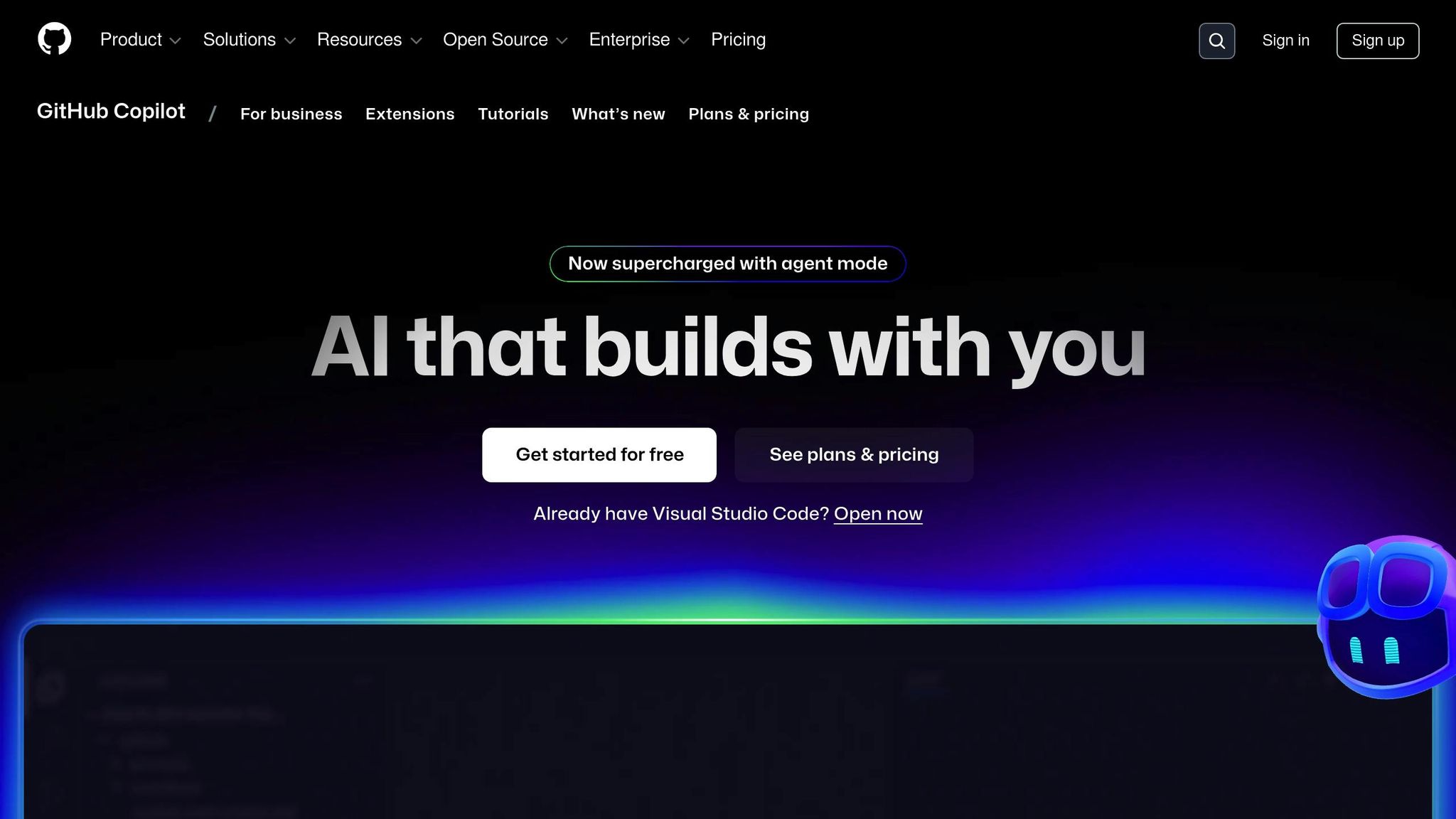
GitHub Copilot is an AI coding assistant that suggests code snippets to make routine development tasks faster and more efficient.
Code Generation Quality
By analyzing the context of your code, Copilot suggests snippets that automate repetitive tasks, like writing boilerplate code. While it’s great for saving time, it may occasionally struggle when dealing with more intricate logic.
Debugging Capabilities
Though it’s not specifically a debugging tool, Copilot can turn descriptive comments into well-structured error-handling code. This makes maintaining and troubleshooting your codebase easier.
Integration with Popular Tech Stacks
Copilot works smoothly with Visual Studio Code and supports a range of widely-used programming languages and frameworks, including React, Next.js, Node.js, and Python. It also provides guidance for integrating with cloud services like AWS S3, Lambda, and DynamoDB. This makes it especially useful for startups in the U.S. aiming to quickly develop MVPs.
Pricing (in USD)
The individual plan is priced at about $10 per month, while team plans cost approximately $19 per user per month. Students and verified open-source contributors can access it for free.
2. ChatGPT

ChatGPT acts as a flexible AI assistant, capable of generating code, explaining programming concepts, and helping debug issues through conversational exchanges.
Code Generation Quality
With clear instructions, ChatGPT can produce useful code snippets. It handles a variety of programming tasks, such as writing API endpoints or designing database schemas, and often includes explanations to support learning.
That said, the code it generates isn’t flawless. It might look correct but could contain subtle errors. Since ChatGPT lacks real-time insight into your specific project, you’ll likely need to tweak the code to align with your architecture and requirements.
Debugging Capabilities
ChatGPT is also helpful when it comes to debugging. By sharing error messages, stack traces, or problematic code, you can use it as a virtual debugging companion. It’s particularly good at spotting issues like syntax errors, logic mistakes, or configuration missteps.
The conversational format lets you ask follow-up questions and dig deeper into the problem. ChatGPT can propose various troubleshooting strategies, from inserting debugging logs to refining error-handling practices.
Integration with US-Based Tech Stacks
ChatGPT shows strong familiarity with widely used tech stacks in the U.S., such as MEAN, MERN, and JAMstack. It also integrates well with popular cloud services and SaaS tools like Stripe, Twilio, and Auth0.
The assistant understands modern deployment workflows popular among American startups, including containerization with Docker and CI/CD pipelines using GitHub Actions.
Pricing (in USD)
ChatGPT offers a free tier with limited usage and slower response times. For $20 per month, the ChatGPT Plus plan provides faster responses, priority access during busy periods, and access to advanced models. Teams needing API access can explore OpenAI’s API pricing, which starts at about $0.002 per 1,000 tokens for the GPT-3.5 model.
3. Tabnine
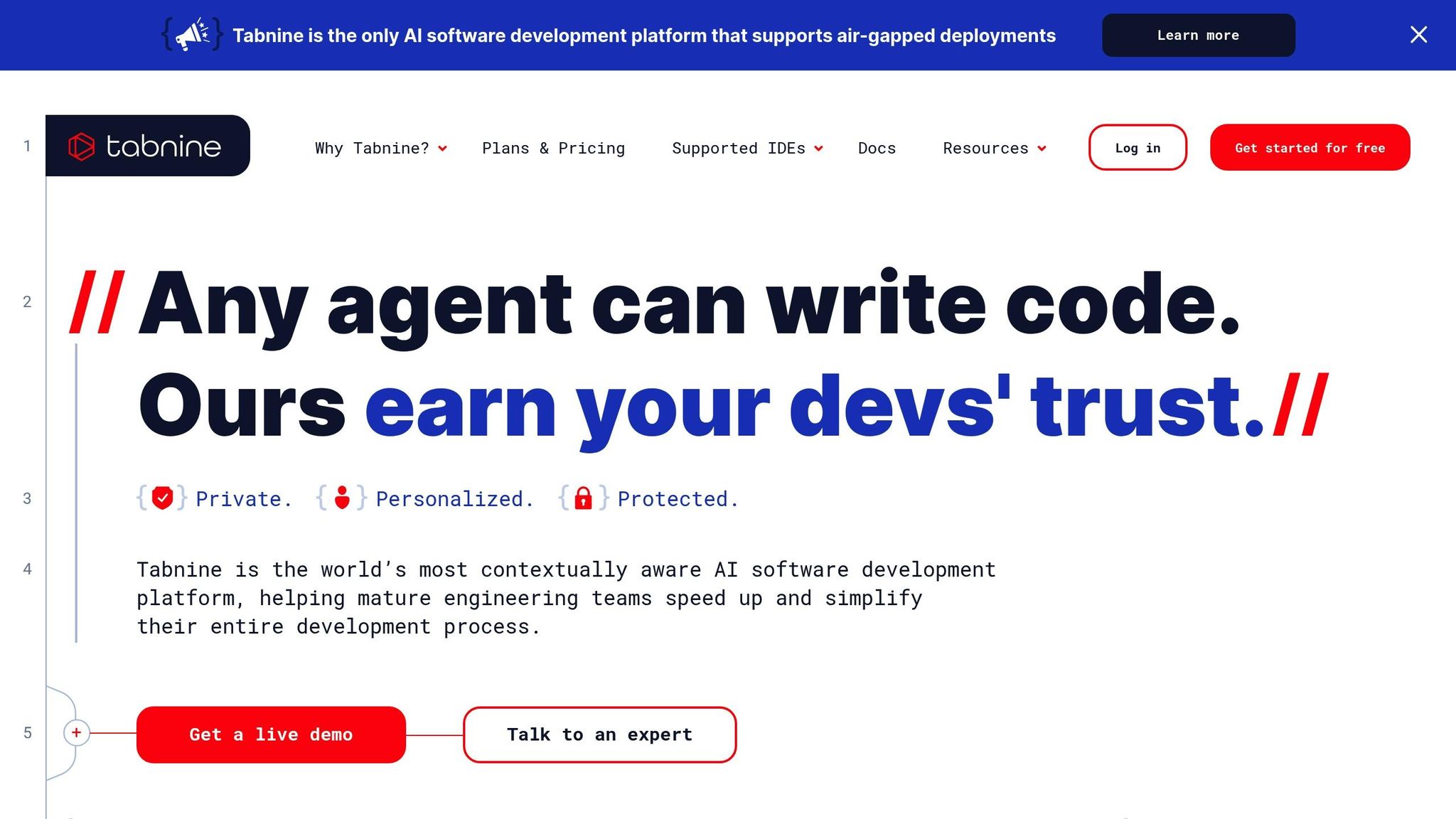
Tabnine takes a different path compared to tools like Copilot and ChatGPT by concentrating exclusively on predictive code completions. It’s an AI-driven tool that works directly within your development environment, offering real-time suggestions as you type. Its main strength lies in predicting what you’re likely to write next.
Code Generation Quality
Tabnine excels at predicting code snippets and even entire functions by analyzing your personal coding habits. This makes it especially handy for handling repetitive tasks or generating boilerplate code when the structure is already well-defined.
Integration with Popular Development Environments
Tabnine integrates smoothly with popular platforms such as Visual Studio Code, IntelliJ IDEA, and Sublime Text. It also supports a wide range of programming languages. This compatibility can significantly enhance productivity, particularly for startups aiming to speed up their MVP development process.
Pricing
Tabnine provides a free tier for basic code completions, with additional features available through paid plans. For the latest pricing details, visit Tabnine’s website.
4. Amazon CodeWhisperer
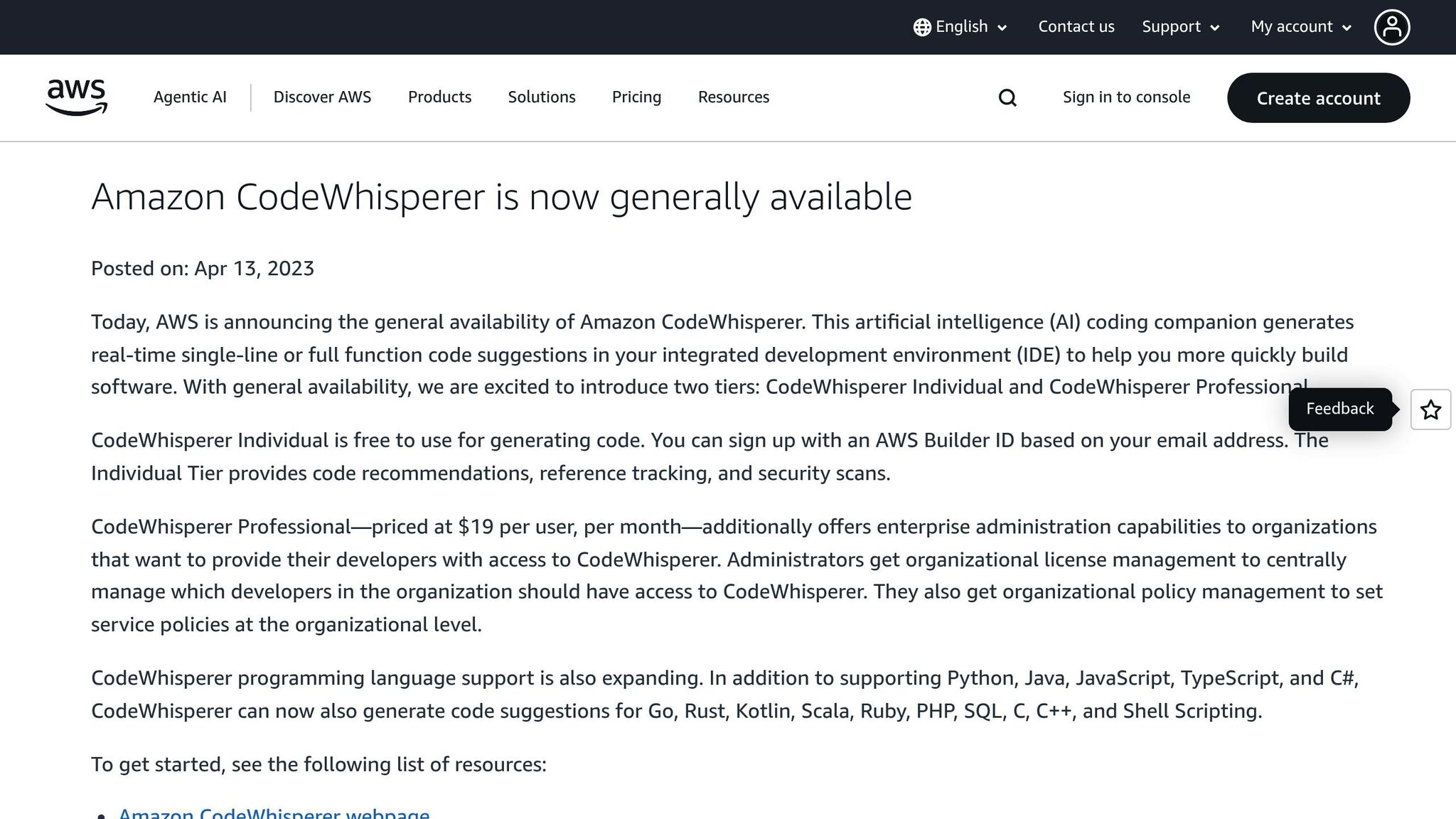
Amazon CodeWhisperer is AWS’s AI-powered coding assistant, designed to integrate seamlessly with AWS services and provide code suggestions tailored to your specific context.
Code Generation Quality
Unlike basic autocomplete tools, CodeWhisperer can generate entire functions based on the context of your code and natural language comments [1][2]. It evaluates your active file, taking into account the libraries and their versions, to deliver recommendations that align perfectly with your project’s requirements. Its ability to understand natural language comments makes it particularly useful for common programming patterns and AWS-specific tasks.
Integration with US-based Tech Stacks
For startups and tech companies in the US, CodeWhisperer offers robust integration with popular IDEs like Visual Studio Code, IntelliJ IDEA, PyCharm, WebStorm, and AWS Cloud9 [1][2]. It supports widely-used programming languages such as Python, Java, JavaScript, C#, and TypeScript [1], and provides targeted suggestions for AWS services like Amazon EC2, Lambda, S3, Rekognition, DynamoDB, SNS, and SQS [1][2].
"Distractions are a constant challenge while coding, especially when it’s necessary to switch context to look up code samples and documentation on the web. Amazon CodeWhisperer keeps me focused on the code by automatically offering helpful suggestions right when I need them, so I never have to leave my editor."
– Ryan Grove, Staff Software Engineer, SmugMug [2]
CodeWhisperer’s collaboration with JetBrains adds even more value for developers. Max Shafirov, JetBrains CEO, shared his enthusiasm:
"We are excited to work with AWS on bringing Amazon CodeWhisperer to the IntelliJ Platform. At JetBrains, we aim to make software development a smooth and enjoyable experience. Availability of the plugin for our tools will help developers stay focused in their IDE and reduce the need to search and customize code snippets from the web. As of today, users of IntelliJ IDEA, PyCharm, and WebStorm can start working with Amazon CodeWhisperer right in their IDE, with more IDEs to be supported in the near future." [2]
These integrations are designed to enhance productivity, all while being offered at a competitive rate.
Pricing (in USD)
Initially, during its preview phase, CodeWhisperer was available for free to all developers [1][2]. However, as of August 9, 2025, the preview period may have ended, and pricing structures might have changed since then. To get the latest pricing updates, check the official AWS CodeWhisperer pricing page.
5. Replit Ghostwriter
Replit AI, formerly known as Replit Ghostwriter, brings AI-assisted coding to Replit’s online IDE, streamlining the process of turning ideas into functional code. It’s especially useful for quickly developing MVPs (Minimum Viable Products).
Code Generation Quality
Replit AI is a standout tool for rapid prototyping, capable of transforming natural language inputs into working applications and automating up to 90% of foundational code [3]. However, its performance can vary when tackling more complex tasks, often requiring human intervention to refine and debug the output.
One of its most notable features is the Replit Agent. This tool is a game-changer for startup founders aiming to transition from concept to prototype in record time. While it excels at producing functional code quickly, achieving production-level quality often demands additional oversight and tweaking. This makes it a great choice for MVP development but less suited for applications where precision and reliability are non-negotiable without further review.
For simpler applications, Replit AI truly shines. Developers with programming knowledge can create and deploy a basic app in just minutes. Its speed and efficiency align perfectly with Replit’s integrated development environment, making it an attractive option for validating concepts quickly.
Integration with US-Based Tech Stacks
Beyond its rapid code generation, Replit AI integrates smoothly with US-based tech stacks. The platform operates on Google Cloud Platform (GCP) data centers located in the United States, with an additional optional region in India [3]. This US-based hosting ensures low latency and compliance with data residency requirements often faced by startups in the US.
Replit supports a wide array of programming languages and frameworks commonly used in the US tech industry. As a cloud-based IDE, it removes the need for local setup, allowing users to start projects instantly. This is especially beneficial for distributed teams, as it lowers the barriers to collaboration and project initiation.
Pricing (in USD)
Replit employs a tiered subscription model paired with usage-based billing:
Core Plans:
- Replit Core: $15-$20/month (billed annually or monthly), includes $25 in monthly usage credits [3].
- Replit Teams: $35-$40/user/month (billed annually or monthly), includes $40 in monthly usage credits per user [3].
AI Features:
- Replit Agent: $0.25 per "checkpoint" (each time the Agent modifies project files) [3].
- Advanced Assistant: $0.05 per "edit request" (when requesting AI help for features or bug fixes) [3].
- Basic Assistant: Free [3].
New users are given 10 free Agent checkpoints and 20 free Advanced Assistant edit requests to explore the platform [3]. However, it’s worth noting that costs can increase if usage exceeds the monthly credits included in the subscription [3].
For startups focused on building MVPs, this pricing structure offers a predictable way to manage budgets during the early stages of development, with expenses scaling naturally as projects grow in scope and complexity.
6. Kite
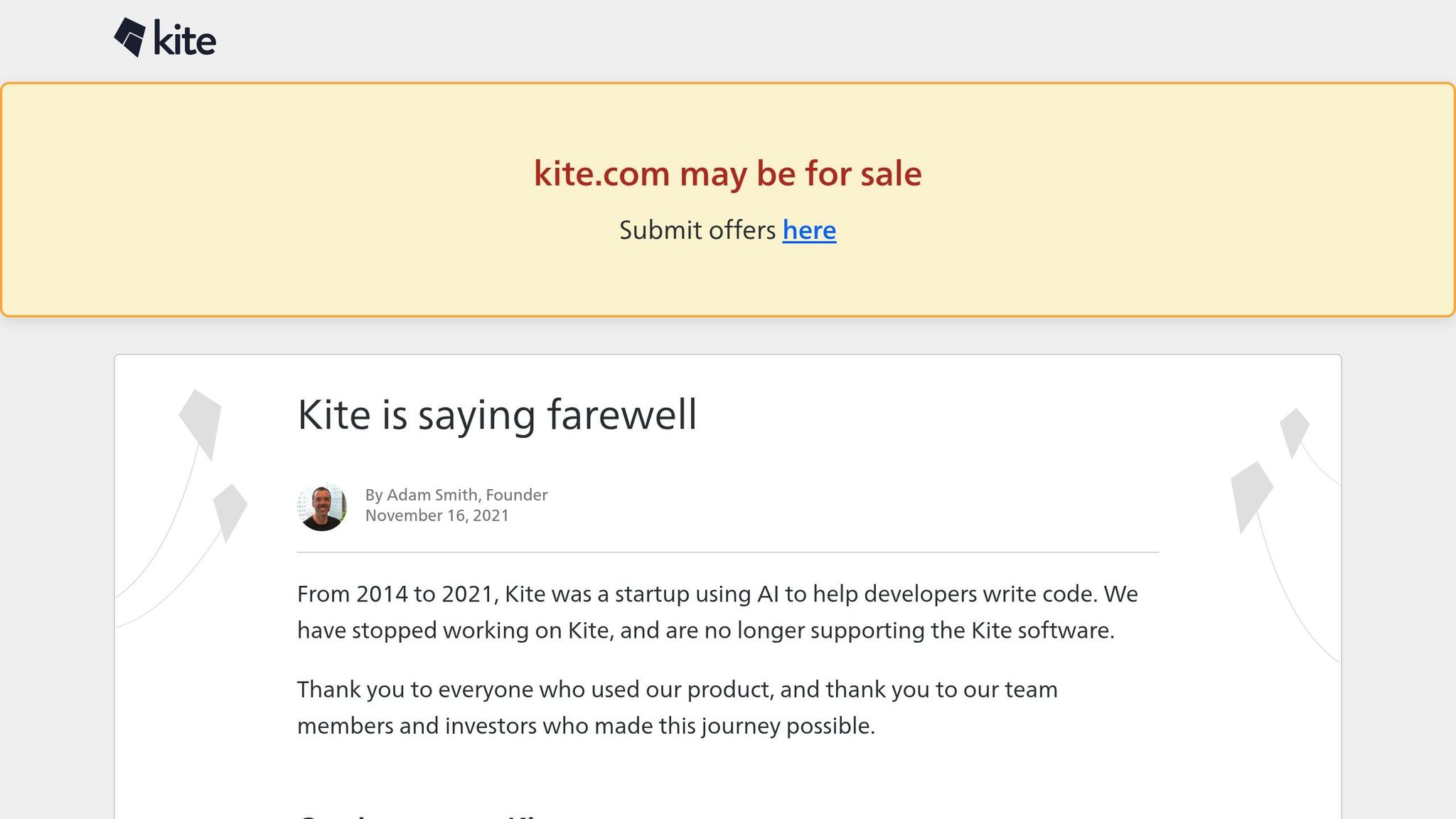
Kite was once a game-changer in the coding world, offering smart autocomplete and helpful suggestions. However, the tool ceased operations in November 2022.
Code Generation Quality
Kite specialized in intelligent code completion, analyzing your code to provide contextual, line-by-line suggestions – essentially, an advanced version of autocomplete. It supported several programming languages, including Python, JavaScript, Go, and Java.
While Kite was effective for handling routine coding tasks and standard patterns, it fell short compared to newer tools. It couldn’t generate entire functions or complex code snippets from natural language inputs, which limited its appeal for those seeking more robust AI coding solutions. Instead, Kite was designed to speed up the existing workflows of experienced developers, making it less ideal for non-technical users or rapid prototyping.
Integration with US-Based Tech Stacks
Kite seamlessly integrated with many of the development environments favored by US tech companies. It offered plugins for popular editors like Visual Studio Code, PyCharm, Sublime Text, Atom, and Vim, ensuring compatibility with tools widely used by American developers. Installation was quick and simple – just a plugin download and setup.
The tool primarily ran locally but also used cloud-based models for additional functionality. This hybrid approach ensured offline usability while addressing concerns about code privacy and security, which are especially critical for US startups working with sensitive data.
Kite’s focus on widely used programming languages like Python (data science and backend), JavaScript (web development), and Go (cloud infrastructure) made it a practical choice for many American startup environments.
Pricing (in USD)
Kite operated on a freemium model. The basic version was free, while the Pro subscription cost $19.99 per month. However, with the company shutting down, these pricing options are no longer relevant.
The shutdown highlighted a key issue: building a sustainable business model around AI-powered coding tools is no small feat. For startup founders, this serves as a reminder to choose tools from companies with strong financial backing and a clear plan for long-term success. Kite’s story reinforces the importance of evaluating a tool’s viability when selecting AI coding assistants for projects like MVP development.
7. Codex by OpenAI
OpenAI’s Codex, the foundation behind tools like GitHub Copilot, showcased the potential of AI in generating code. While Codex highlighted the impressive capabilities of AI-driven coding, OpenAI has since shifted its focus to newer GPT models.
Code Generation Quality
Codex stood out for its ability to transform natural language instructions into functional code across various programming languages, including Python and JavaScript. It could generate everything from individual functions to entire programs based on straightforward English prompts.
The model excelled at understanding context, maintaining consistency across extensive code blocks, and handling complex tasks like algorithms, data structures, and API integrations. Python and JavaScript were its strongest suits, often producing code that was nearly ready for production. However, developers occasionally needed to refine the output by adding error handling or making optimizations.
Integration with Popular Tech Stacks
Codex was designed to integrate effortlessly into workflows through OpenAI’s REST API, making it easy to incorporate into existing systems.
It performed effectively with modern web development tools like React, Node.js, and Express, enabling the quick creation of boilerplate code. For cloud services, Codex could generate code for platforms such as AWS and Google Cloud Platform. In data science, it worked well with libraries like pandas, NumPy, scikit-learn, and TensorFlow, producing scripts and pipelines that seamlessly fit into tools like Jupyter notebooks. These capabilities, combined with its flexible pricing, made Codex especially appealing to startups.
Pricing (in USD)
Codex operated on a usage-based pricing model through OpenAI’s API, offering an affordable solution for startups. Despite the emergence of newer GPT models, Codex remains a milestone in the evolution of AI-assisted coding.
8. CodeT5
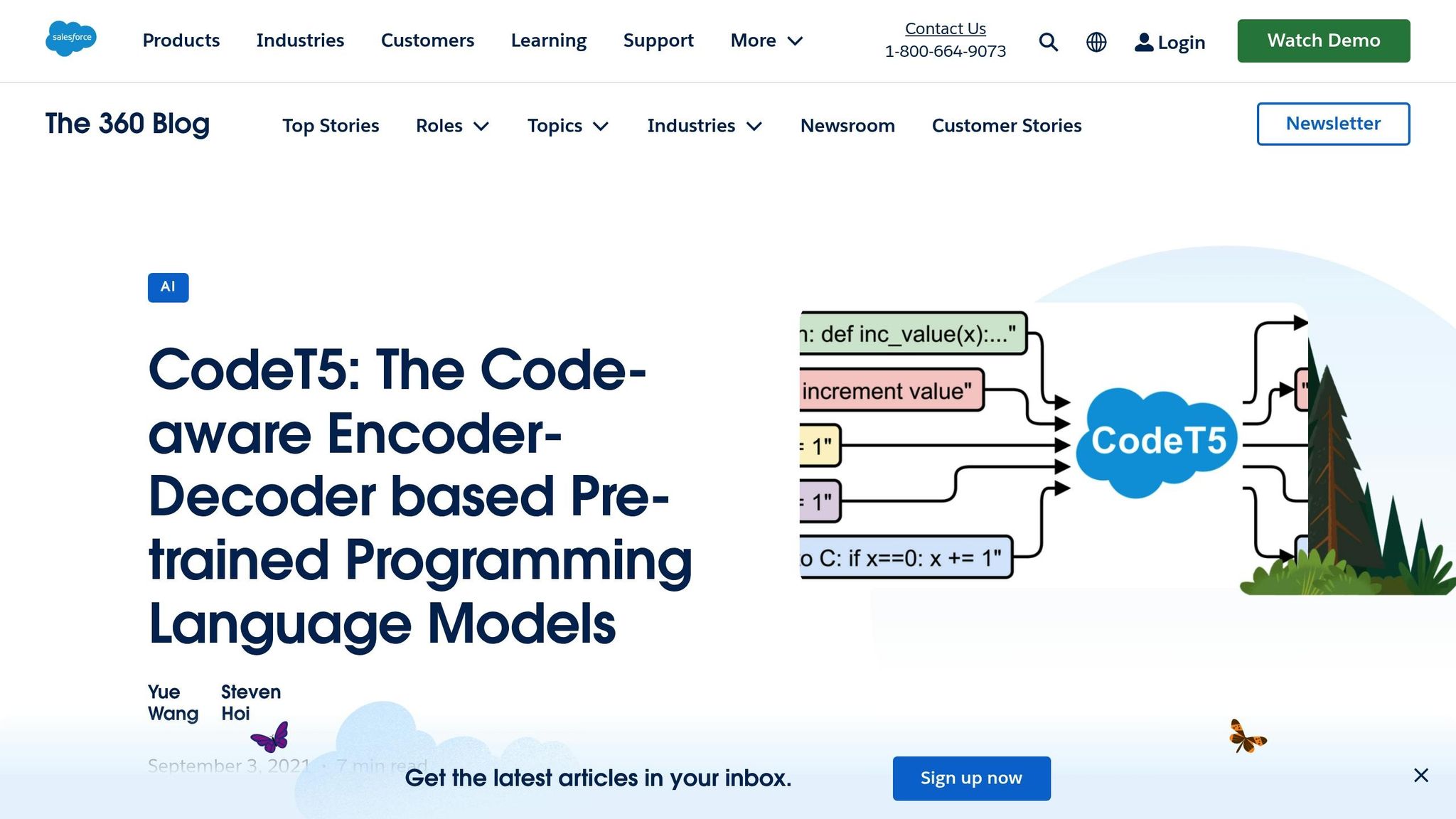
CodeT5, Salesforce’s open-source AI coding assistant, offers a budget-friendly solution with the added benefit of in-house deployment. This makes it especially appealing to startups that prioritize cost savings and data security. Here’s a closer look at its capabilities in code generation, integration, and affordability.
Code Generation Quality
CodeT5 transforms natural language prompts into functional code, making it easier to develop features, improve documentation, and onboard new team members. It also provides suggestions for code optimizations, helping developers work more efficiently.
Deployment and Integration
Thanks to its open-source nature, CodeT5 can be customized and deployed based on your team’s specific requirements. This ensures complete control over data privacy while allowing smooth integration into a variety of workflows.
Pricing (in USD)
Salesforce highlights that by releasing pre-trained models to the public, they eliminate the need for repeated pre-training. CodeT5 is free from licensing fees, meaning the only costs involved are related to the infrastructure needed to run the model.
"We open source and release our pre-trained models publicly to avoid repeated pre-training for the community." [4]
9. DeepCode
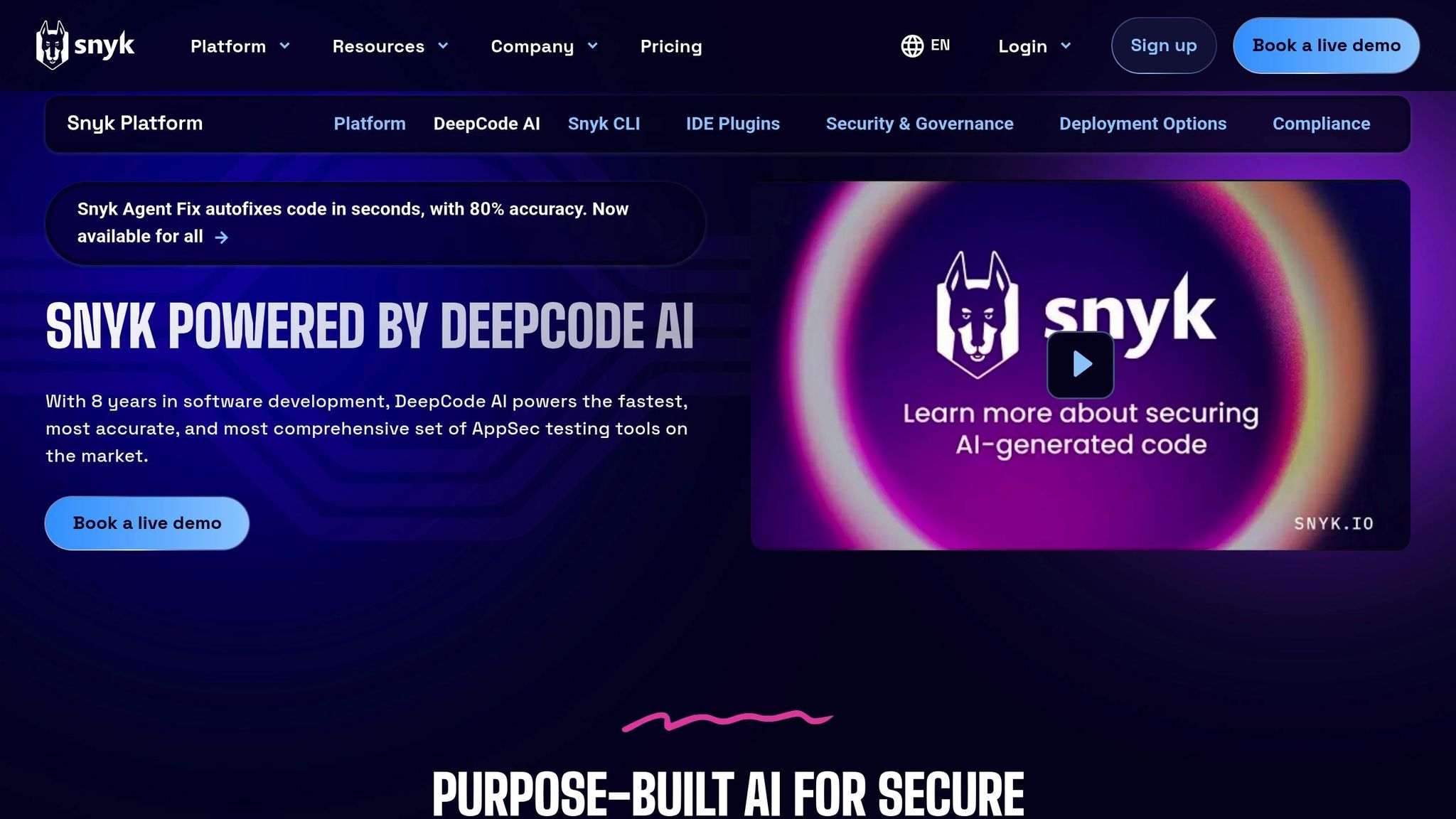
DeepCode is an AI-driven code review tool designed to promote clean coding standards. It scans your codebase to identify bugs early in the development process, helping you catch issues before they snowball. This early detection lays a solid groundwork for building MVPs quickly and efficiently. By simplifying quality control at every stage, DeepCode adds an essential layer of reliability to your development workflow.
10. MutableAI
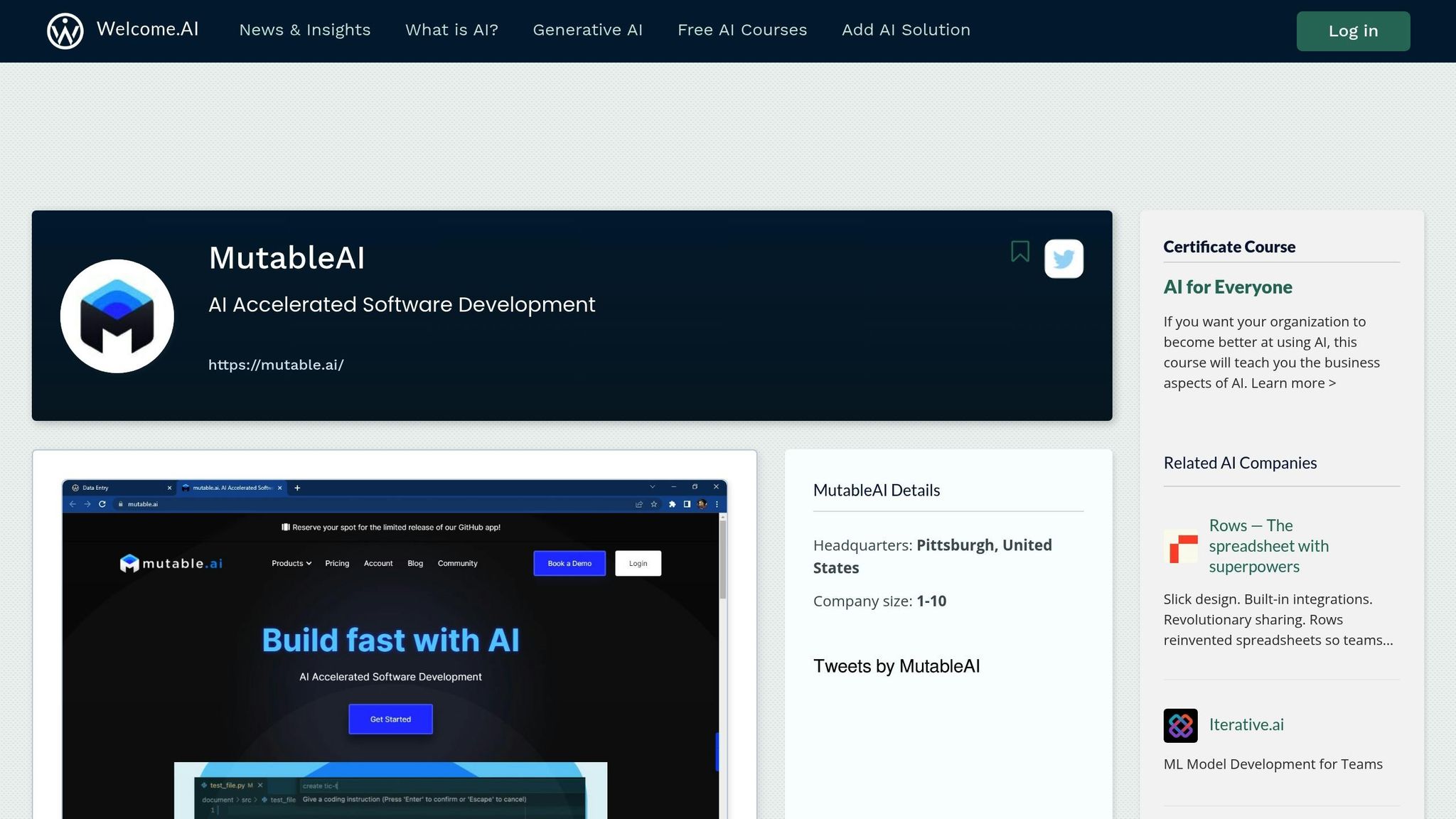
MutableAI works seamlessly with GitHub, offering smart refactoring and real-time debugging tools. These features not only help maintain high code quality but also speed up the development process. Let’s dive into how its debugging tools make resolving issues faster and more efficient.
Debugging Capabilities
MutableAI shines with its real-time debugging, catching errors as you code[5]. By identifying issues early, it helps ensure bugs don’t make their way into production[6]. On top of that, its AI-powered testing tools can automatically create test cases and spot potential problems, allowing teams to address them quickly[7].
"The AI tools provided by Mutable.ai have significantly improved our workflow efficiency. The code generation capabilities have saved us hours of manual coding, and the AI testing tools have helped us identify and fix bugs faster. We’re impressed with the results!" – Sarah, Project Manager[7]
Integration with US-Based Tech Stacks
With its deep GitHub integration, MutableAI simplifies code reviews, especially for startups in the US that rely heavily on GitHub workflows. The tool works within your existing development setup, requiring no extra configuration. This makes it an ideal solution for distributed teams, which are common in the US tech industry.
"Mutable.ai’s GitHub app has completely transformed our development process. The seamless integration with our GitHub repositories has improved collaboration and made code review a breeze. It’s a game-changer for our team!" – John, Software Engineer[7]
Pricing (in USD)
MutableAI offers free access for open-source projects[6]. For commercial use, it provides tiered plans – Basic, Premium, and Enterprise[6] – allowing startups to explore the tool’s features before committing to a paid plan.
11. Sourcegraph Cody

Sourcegraph Cody is designed to analyze your entire codebase, enabling it to generate context-aware code. This makes it particularly helpful for startups dealing with complex systems where understanding code relationships is crucial.
Code Generation Quality
Cody tailors its code generation to your project by examining your repository’s structure, patterns, and architecture. This ensures the generated code aligns with your project’s style. For large codebases, where maintaining consistency can be tricky, Cody proves especially handy. It can create functions that seamlessly integrate with existing APIs, stick to your project’s error-handling standards, and follow established styling conventions.
Debugging Capabilities
Cody’s debugging tools are built around a deep understanding of your code. It doesn’t just stop at spotting syntax errors – it can trace issues across multiple files and components. This feature is invaluable in setups like microservices or intricate frontend-backend integrations, where bugs often span several parts of the system.
Integration with US-Based Tech Stacks
Cody works with popular IDEs such as Visual Studio Code, JetBrains, and Neovim, and supports repositories hosted on platforms like GitHub, GitLab, or Bitbucket. Its seamless integration ensures that teams can adopt Cody without interrupting their existing CI/CD workflows. This compatibility allows for smooth transitions and uninterrupted development processes.
Pricing (in USD)
Sourcegraph Cody provides a free tier, offering basic code completion and chat features – perfect for startups operating on tight budgets. For teams needing advanced capabilities, like full-context analysis across the entire codebase, paid plans are available. Pricing details are available on Sourcegraph’s official website.
sbb-itb-51b9a02
12. Codeium

Codeium is a free AI-powered coding assistant designed to help developers with code completion and generation across multiple programming languages. It simplifies the early stages of development, making it a helpful tool for startups aiming to speed up their workflows.
Code Generation Features
Codeium excels at generating accurate, context-aware code. Its suggestions align with your coding style and can handle multi-line code generation. With support for various programming languages, it ensures your project stays consistent and efficient.
Debugging Support
Beyond writing code, Codeium includes a chat-based interface that assists with debugging. This feature provides clear explanations for debugging issues and offers suggestions to improve your code, making the process smoother and less time-consuming.
Compatibility with US-Based Development Tools
Codeium integrates seamlessly with popular IDEs and version control systems. This compatibility ensures it fits naturally into existing development workflows, supporting productivity without requiring extra setup.
Pricing (in USD)
Codeium offers a free plan that covers essential code generation and assistance features. For teams needing more advanced features, such as tailored options or dedicated support, enterprise pricing is available upon request.
13. CodePal
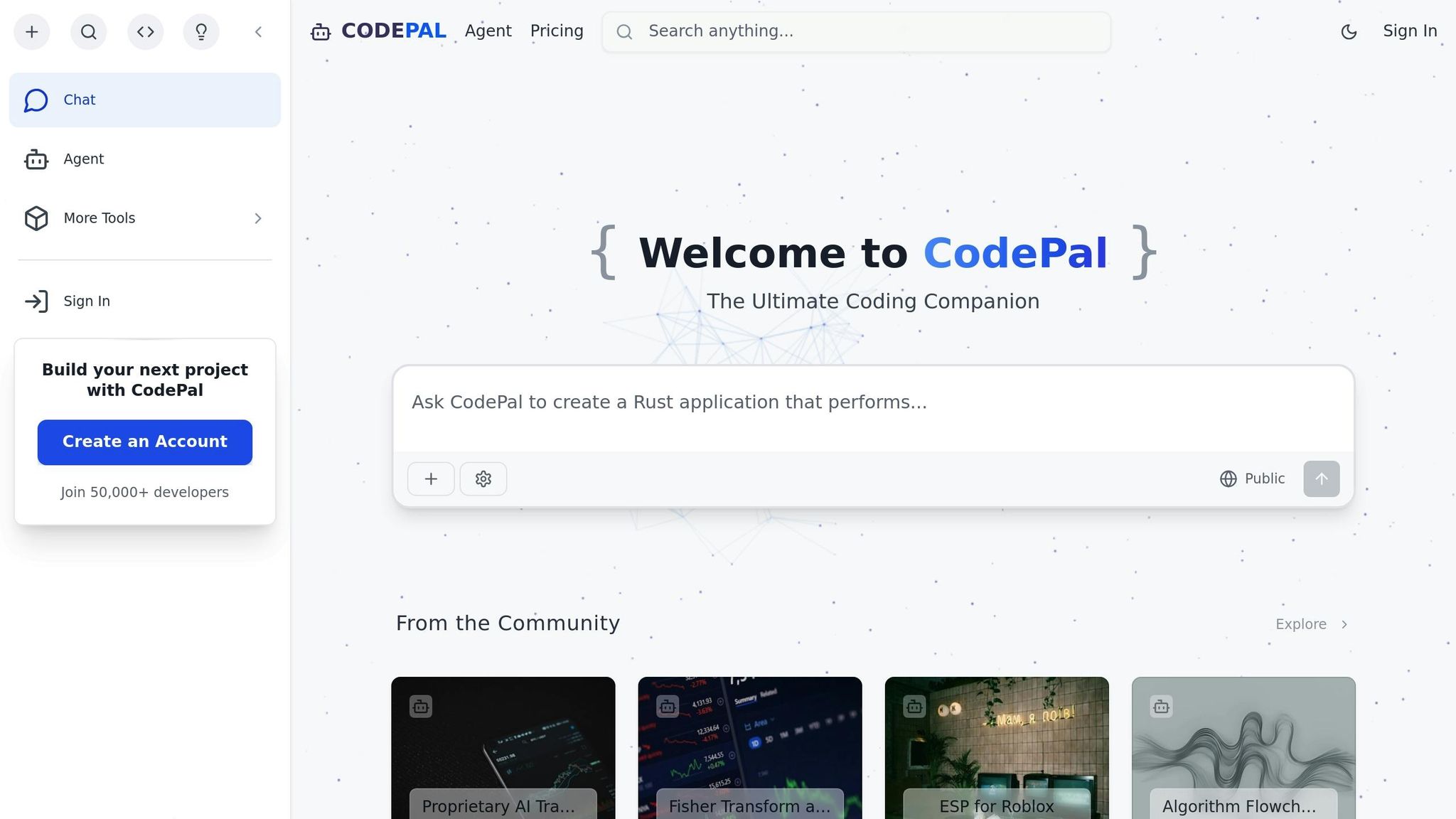
CodePal is an AI-powered coding assistant that transforms plain language into functional code across multiple programming languages. It’s designed to cater to both beginners and experienced developers.
Code Generation Quality
CodePal focuses on converting natural language into code, much like other tools in this space. However, its interface presents some unique challenges. The AI Code Generator is effective at producing functional code from descriptions, supporting a variety of programming languages. That said, users must navigate through separate pages to access tools, and the system generates only one function per request. If the output doesn’t meet expectations, you’ll need to regenerate it.
Pricing (in USD)
CodePal provides a "free forever plan", which includes access to all tools and features – an attractive option for startups mindful of their budgets. While the free tier has its limitations, it allows users to explore the platform’s potential without any upfront costs.
"CodePal is a good tool for students, beginners, experienced developers, and companies looking to enhance their development processes." – Unite.AI [8]
For those needing more advanced features, CodePal offers paid plans with expanded capabilities. However, details about these premium tiers aren’t publicly disclosed [8].
"After trying CodePal, I can honestly say it’s an incredibly user-friendly yet robust tool that both beginner and expert developers can use." – Janine Heinrichs, Unite.AI [8]
With its permanent free plan and reasonably priced upgrades, CodePal provides an accessible option for anyone interested in AI-assisted coding.
14. JetBrains AI Assistant
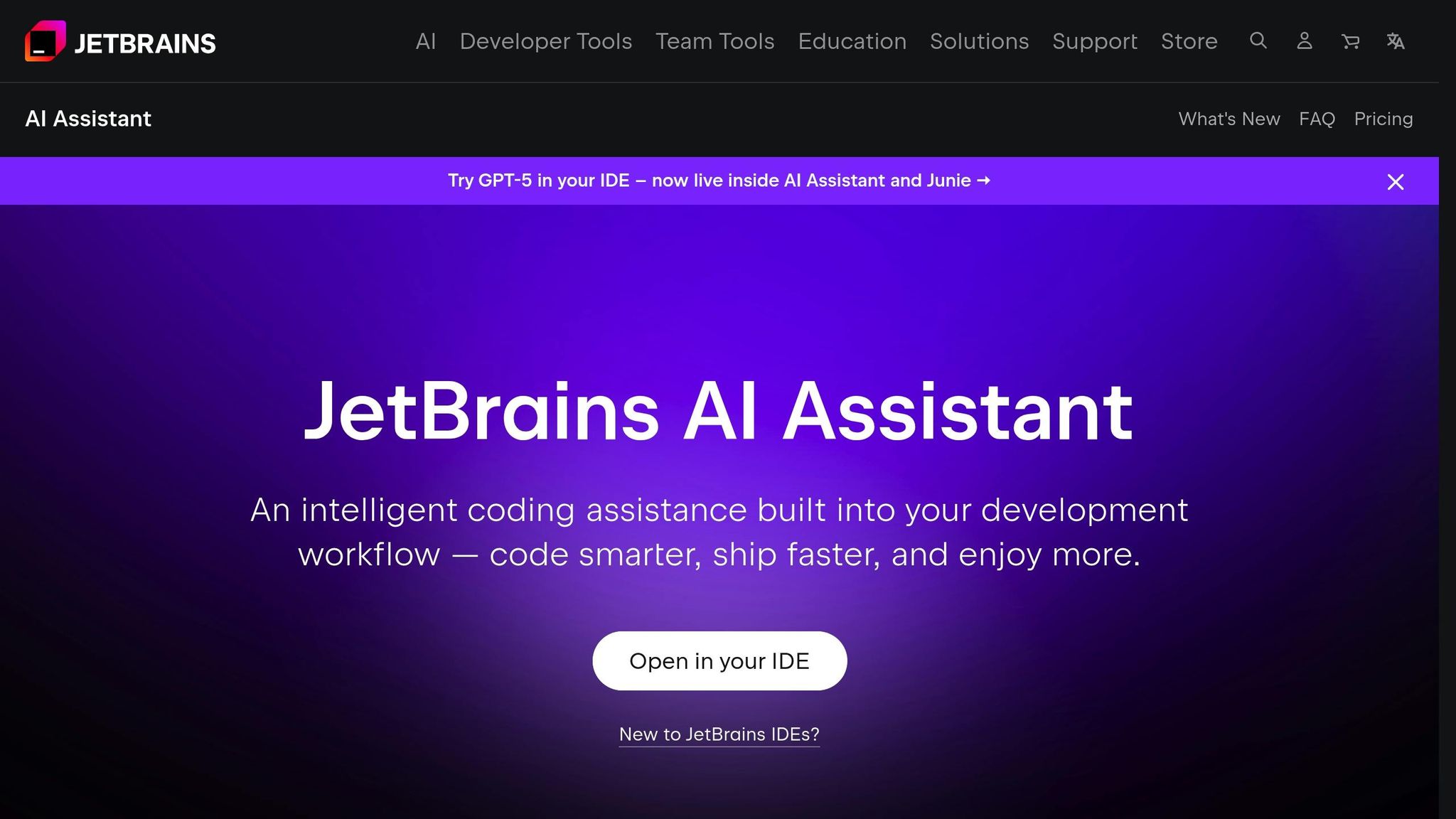
JetBrains AI Assistant is designed to integrate seamlessly with JetBrains IDEs, Android Studio, and Visual Studio Code. It offers context-aware code generation that aligns with your project’s style and conventions. From natural language prompts, it can generate functional code, support cross-language development, and even automatically create well-structured unit tests to maintain code quality.
For startup teams working on MVPs, this tool ensures your code adheres to your specific style and naming conventions. Its ability to produce unit tests automatically is particularly helpful during fast-paced development, reducing the risk of bugs and keeping your codebase reliable.
The AI Assistant also allows you to choose your preferred AI model. You can opt for JetBrains’ own LLM, Mellum, which is optimized for code completion, or connect to other leading models like Google Gemini, OpenAI, or Anthropic. For teams with stricter privacy needs, local models can be integrated through Ollama or LM Studio. This flexibility ensures the tool fits smoothly into existing workflows, no matter your setup.
Integration with US-Based Tech Stacks
With native integration into Android Studio and Visual Studio Code, the AI Assistant simplifies both mobile and web development. It provides smart code completion for everything from single lines to complete code blocks, all within your familiar IDE. This eliminates the need to switch tools or learn new interfaces, keeping your workflow efficient and uninterrupted.
Pricing (in USD)
JetBrains offers these AI features for free as part of its IDEs [9][10]. This free tier includes essential functionalities like code generation, completion, and unit test creation, making it a robust option for most MVP development needs. However, some user forums suggest that premium tiers may be introduced in the future, though no official details have been shared yet.
JetBrains also takes privacy seriously. They ensure that user code and data are not used to train AI models, and when external LLMs are utilized, no data is retained by third-party providers [9][10]. This approach addresses common concerns about security and data protection in AI-assisted development.
15. PolyCoder
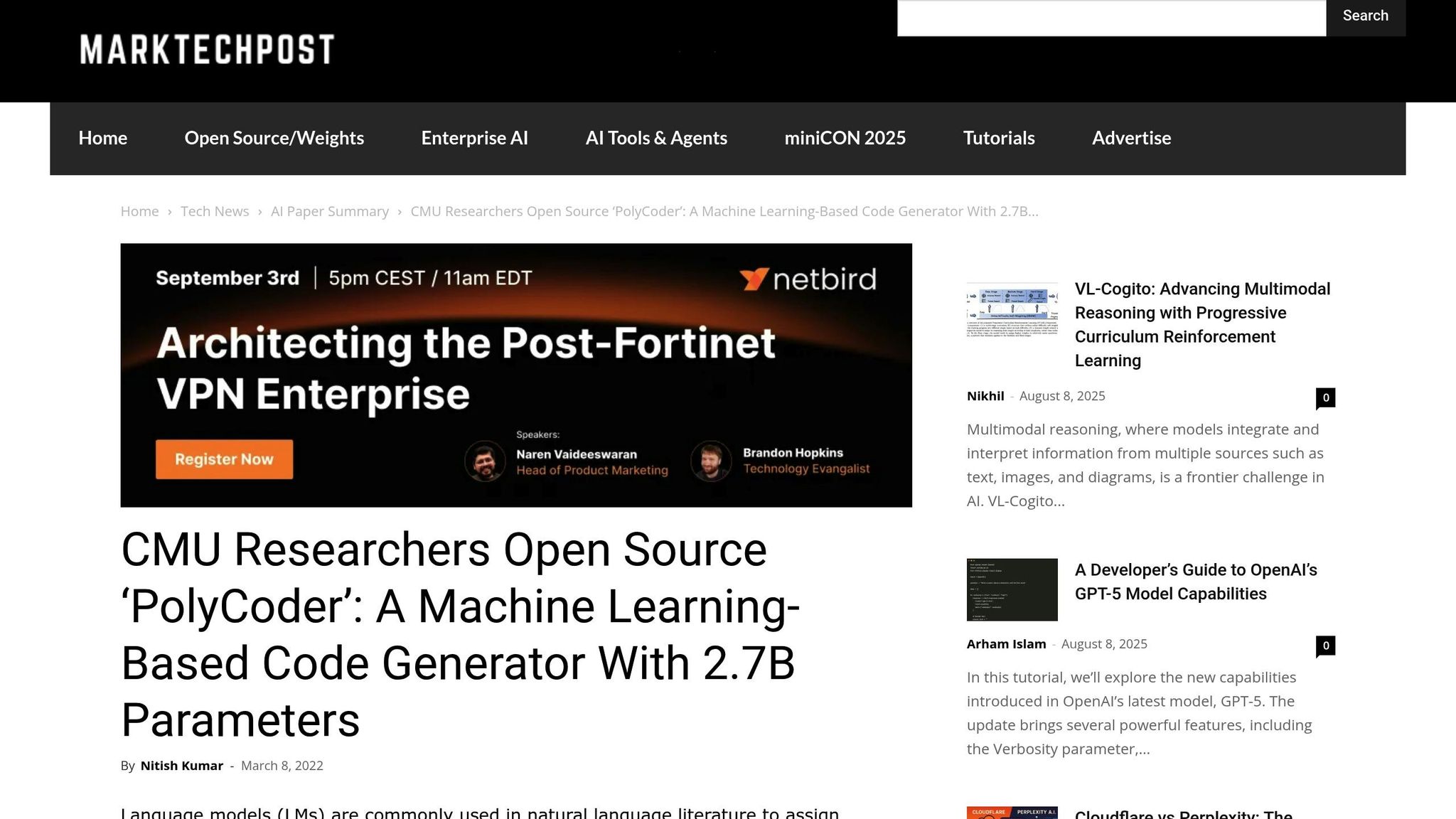
PolyCoder is a completely open-source AI coding tool developed by researchers at Carnegie Mellon University. Its open-source framework offers developers the freedom to customize and control their coding environment, making it an attractive choice for teams that prioritize flexibility and control.
For startup teams, PolyCoder is particularly noteworthy for its strength in generating C code. Trained on a massive 249 GB codebase spanning 12 programming languages, it showcases a strong grasp of coding patterns and structures[11]. This extensive training ensures reliable performance, especially in systems-level programming tasks.
Code Generation Quality
PolyCoder excels in generating accurate C code, even outperforming Codex in this area[11]. Beyond C, it supports several other languages, including Java, JavaScript, Python, and Lua. Its Lua API integration is especially useful for rapid prototyping, as it eliminates the need for C++ compilation[11].
Another standout feature is its ability to be fine-tuned for specific projects or workflows[12]. This adaptability allows teams to tailor the tool to their unique coding needs, making it a versatile choice for a range of applications. However, its setup and integration may require more technical expertise compared to other tools.
Integration with US-Based Tech Stacks
Being open-source, PolyCoder demands a more hands-on approach to integration. Unlike commercial tools that often offer plug-and-play solutions, PolyCoder requires technical expertise to incorporate into development environments. While this means it can be adapted to virtually any tech stack, it also comes with a trade-off: the tool lacks the polished interfaces and advanced features of many commercial alternatives[12]. For teams with limited technical resources, the additional effort required for setup and maintenance might be a challenge.
Pricing (in USD)
PolyCoder is completely free and open-source[11][12]. There are no licensing fees or usage restrictions, making it an excellent choice for startups operating on tight budgets. However, while the software itself is cost-free, teams should account for the time and resources needed for setup, fine-tuning, and ongoing upkeep.
For teams with strong technical expertise and a need for a customizable, budget-friendly solution, PolyCoder offers a solid option worth considering.
16. Codiga
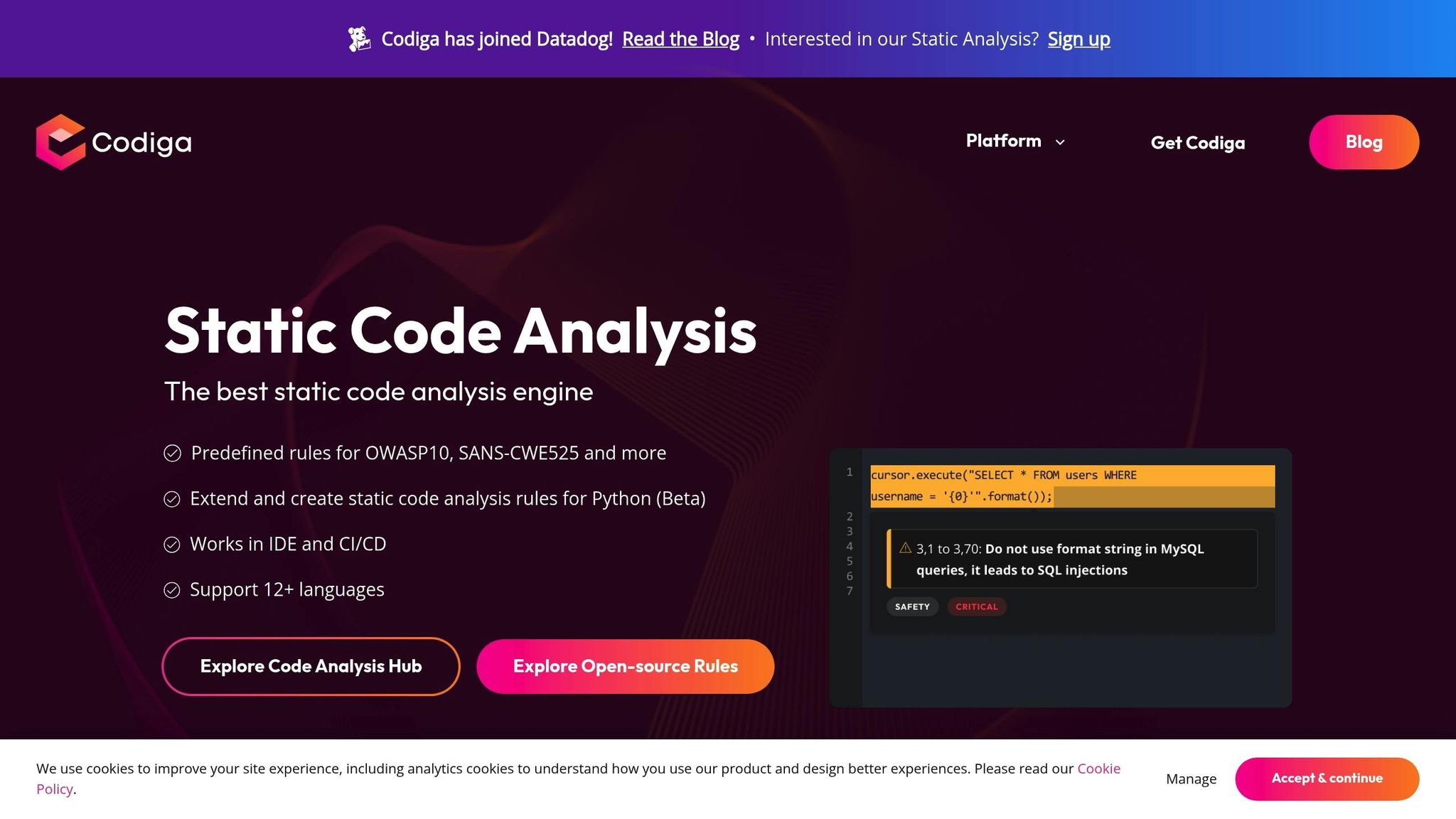
Codiga stands out by focusing on improving existing code through static analysis and real-time feedback. It’s particularly well-suited for startups aiming to maintain high code quality while rapidly developing their MVPs.
The platform specializes in spotting vulnerabilities, enforcing coding standards, and offering automated fixes to tackle issues before they escalate into expensive technical debt.
Code Generation Quality
Rather than creating new code, Codiga provides inline suggestions and smart snippets based on your existing codebase (see [13][14][15]). It acts as a safeguard for quality, identifying code violations, redundancies, and complexity problems while ensuring adherence to security standards like OWASP 10, MITRE CWE, and Sans/CWE Top 25. With its autofix feature, Codiga doesn’t just highlight issues – it also applies fixes automatically, saving developers valuable time and effort.
These improvements integrate smoothly into tools commonly used in U.S. startup environments, making the process seamless for development teams.
Integration with US-Based Tech Stacks
Codiga integrates directly into popular IDEs, offering real-time analysis and automated fixes (see [13][14][15]). It also supports infrastructure code analysis for tools like Terraform and Docker. Teams can customize the analysis using rules from Codiga Hub or their own defined standards, ensuring alignment with their specific needs. Additionally, Codiga provides quick, automated code reviews with dashboards that highlight metrics such as code violations, duplication, and complexity. These insights help teams monitor and improve their code quality over time.
Pricing (in USD)
Codiga offers a free, forever-accessible tier for individuals, allowing up to 10 code analyses per day [15]. This is a great option for solo developers or small teams exploring the platform’s capabilities. For larger teams, there’s a paid "Teams" plan, along with a startup program that includes discounts to suit early-stage budgets. While the free tier’s 10-analysis limit might feel restrictive during active development, it’s a practical way to evaluate the tool before committing to a paid plan.
17. IntelliCode by Microsoft
Microsoft’s IntelliCode offers a unique spin on AI-assisted development by prioritizing context-aware code completions rather than generating entire blocks of code. It uses machine learning models trained on thousands of highly rated open-source GitHub repositories to predict the next method or property you’re likely to need. This helps developers code faster and more efficiently, minimizing interruptions in their workflow[16][17].
Code Generation Quality
What sets IntelliCode apart is its ability to provide intelligent suggestions tailored to your current coding context. It offers context-aware autocompletions, whole-line suggestions, and argument completions. By analyzing your code in real-time, it identifies the most logical next steps based on patterns from trusted codebases. This not only speeds up development but also encourages the use of well-established coding practices[16][17][18].
Integration with US-Based Tech Stacks
IntelliCode seamlessly integrates with both Visual Studio and Visual Studio Code, making it a natural fit for U.S. development teams. It supports popular programming languages like C#, Python, JavaScript, and TypeScript, enabling smoother workflows. By focusing on automating repetitive tasks, IntelliCode enhances productivity without adding unnecessary complexity to the development process.
18. AIHelperBot
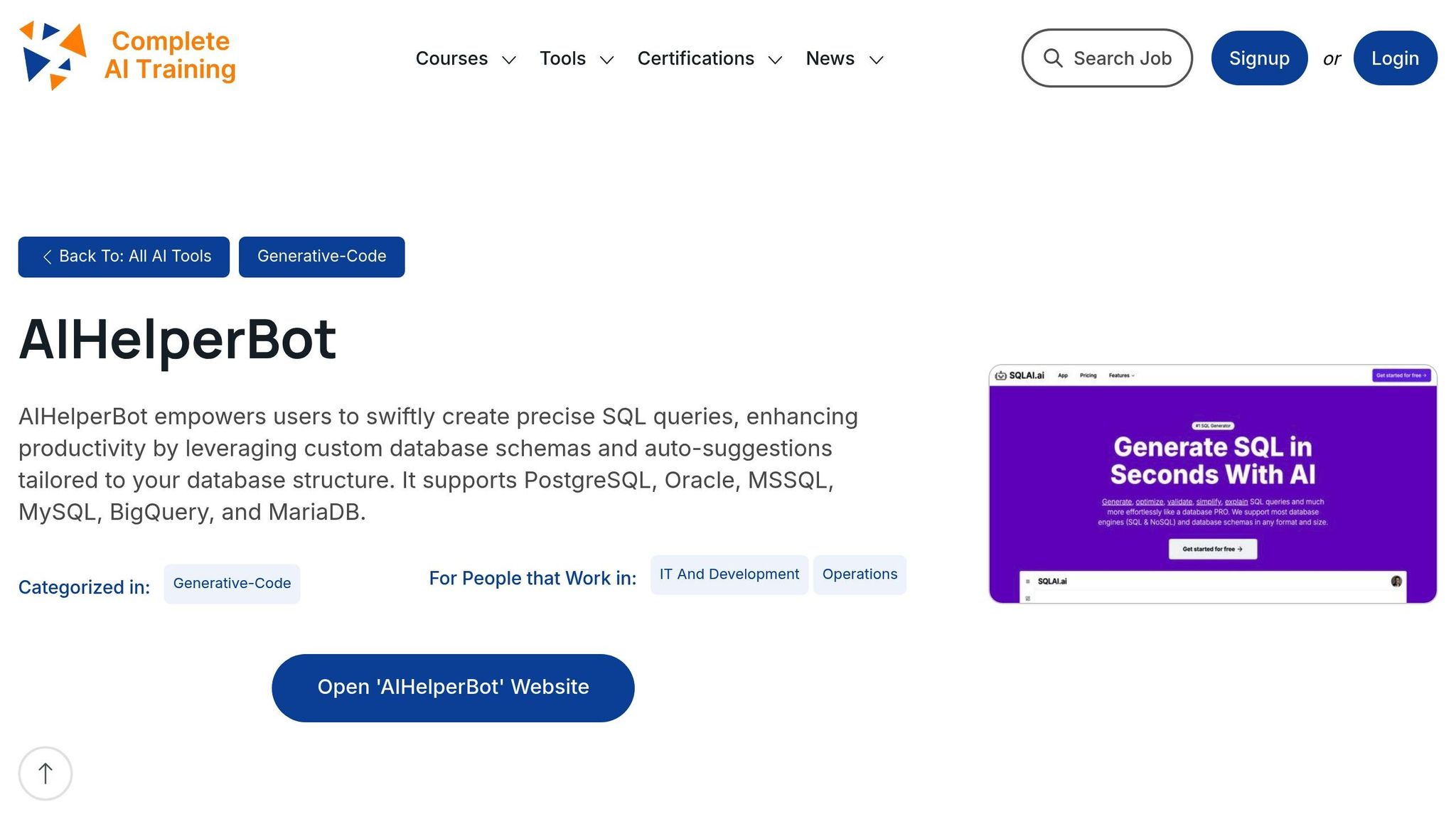
AIHelperBot brings a different angle to the table by honing in on cloud service configurations. It’s particularly handy for developers working with US-based tech stacks like AWS, Azure, or Firebase. Through its web-based chat interface, AIHelperBot creates configuration files and connection code customized for specific cloud services. This makes setting up cloud integrations faster by automating repetitive configuration tasks. That said, since it functions outside local development environments, developers still need to manually incorporate the generated code into their projects.
19. AskCodi
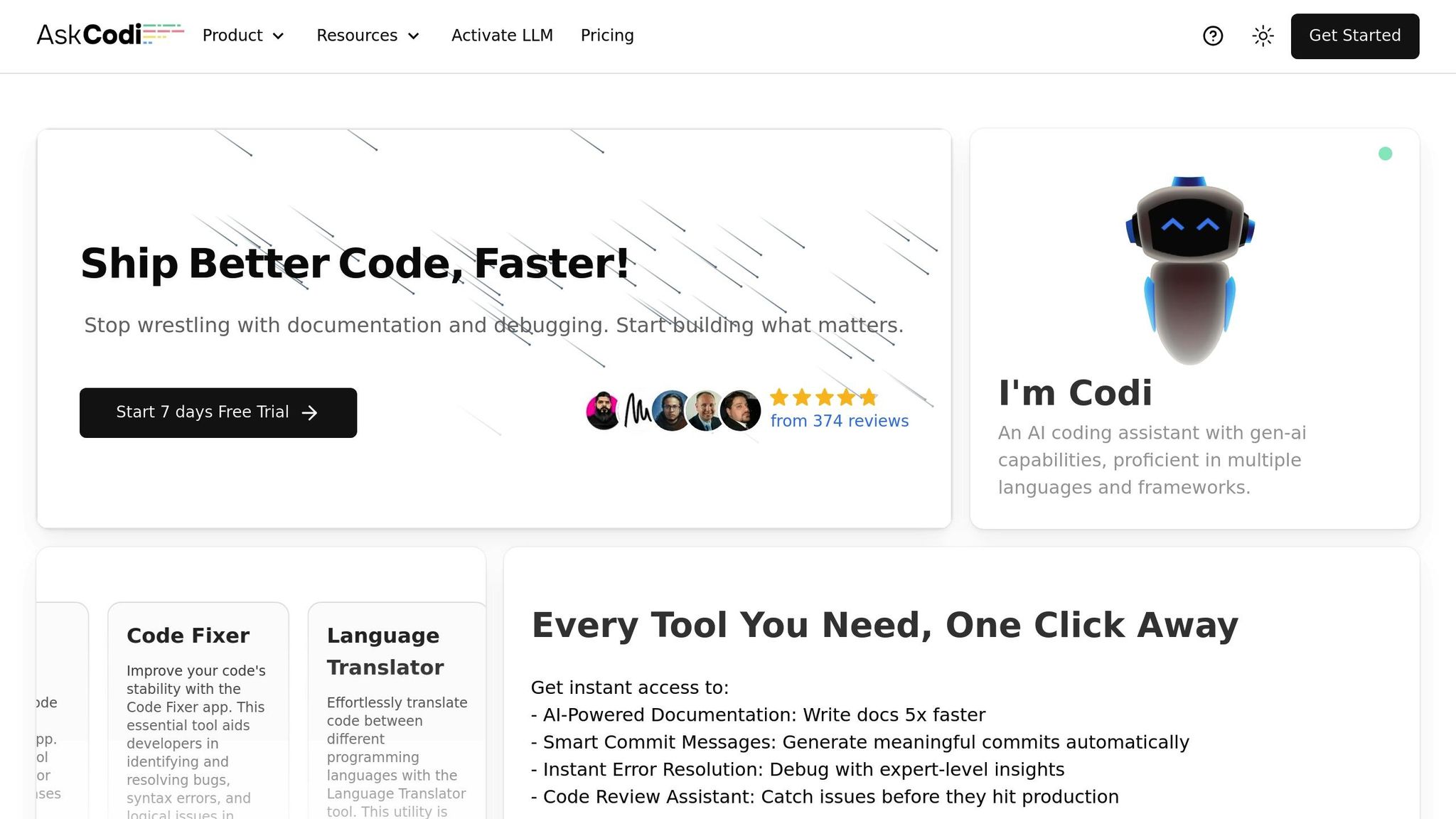
AskCodi is a conversational AI coding assistant designed to simulate technical discussions through chat. It supports multiple programming languages and offers features like code generation and explanation, making it handy for startup teams with varying levels of technical expertise. Let’s dive into its strengths in code generation, debugging, and integration within common tech ecosystems to see how it fits into startup MVP development.
Code Generation Quality
AskCodi can turn plain-English prompts into functional code for tasks like REST API endpoints, database queries, and boilerplate web components. For straightforward requests, the generated code often requires only minor tweaks. It shines when producing standard patterns that developers frequently use – like authentication middleware or form validation logic.
However, for more complex tasks, such as designing intricate architectures or specialized algorithms, the output often demands thorough review and refinement. The tool supports languages like Python, JavaScript, Java, C++, and PHP, but its performance is strongest with Python and JavaScript, likely due to the abundance of training data in these languages. As the complexity of requests increases, the reliability of the generated code tends to decrease.
Debugging Capabilities
AskCodi doesn’t just generate code – it also helps troubleshoot it. Developers can paste problematic code into the chat and ask for explanations or solutions to errors. The tool provides clear, concise explanations and offers suggestions to address common issues.
Its debugging strengths lie in identifying logical errors and syntax mistakes, such as missing semicolons, incorrect variable references, or faulty conditional logic. However, it struggles with more advanced issues like memory leaks, race conditions, or performance optimizations that require a deeper understanding of system-level behavior.
Integration with US-Based Tech Stacks
AskCodi integrates seamlessly with major tech ecosystems commonly used in the US, making it a good fit for startups. It supports cloud platforms like AWS, Google Cloud, and Azure, and works well with frameworks such as React, Node.js, Django, and .NET.
For API integrations, it generates connection code and basic implementation examples for widely used services like Stripe (payments), Twilio (communications), and SendGrid (email). While it handles these integrations effectively, developers still need to manage details like authentication and error handling.
When it comes to databases, AskCodi supports both SQL and NoSQL options, including PostgreSQL, MySQL, MongoDB, and DynamoDB. The generated queries and connection code generally follow best practices, incorporating error-handling mechanisms.
Pricing (in USD)
AskCodi uses a freemium pricing model, making it accessible to individual developers and startups.
- The free plan offers basic code generation and explanation features, with monthly usage limits.
- The Pro plan, at $9.99 per month, removes most usage restrictions and includes faster response times along with advanced features.
- The Team plan, priced at $19.99 per user per month, adds collaboration tools like shared workspaces and enhanced support.
- For larger organizations, enterprise pricing is available on request, offering custom integrations, dedicated support, and compliance-specific features.
This tiered approach ensures affordability for small teams while scaling to meet the needs of larger groups.
20. Codota
Codota is an AI-powered coding assistant tailored for Java and Kotlin, making it a great fit for speeding up startup MVP development. By analyzing millions of open-source code examples, it provides context-aware suggestions that align with industry standards. After acquiring TabNine, Codota’s user base skyrocketed, growing by over 1,000% to more than 1 million developers monthly. Major U.S. tech companies like Google, Amazon, Netflix, Airbnb, and Atlassian have adopted Codota for their workflows[19][20].
Code Generation Quality
Codota excels at generating context-sensitive code suggestions for Java, Kotlin, and other JVM-based languages. By tapping into a vast database of open-source examples, it offers predictive completions that cut down on boilerplate code while ensuring adherence to industry standards.
Debugging Capabilities
Codota simplifies debugging by automatically managing imports and suggesting fixes for common syntax errors. Its algorithms adapt to individual coding patterns, flagging potential deviations from established practices. This not only reduces repetitive tasks but also enhances code quality. Additionally, the engineering team rigorously vets and tests recommendations to maintain high-quality outputs. These debugging features integrate seamlessly into Codota’s broader functionality, making it a reliable tool for developers[20].
Integration with U.S.-Based Tech Stacks
Codota works effortlessly with popular integrated development environments (IDEs) like IntelliJ IDEA, Android Studio, Visual Studio Code, Eclipse, and WebStorm. While its primary focus is Java and Kotlin, it also supports other languages like Python, JavaScript, C, HTML, and Scala, offering flexibility for full-stack development. For enterprise users, Codota provides both cloud-based and on-premises options, allowing teams to incorporate it into their workflows while meeting specific security needs.
Pricing (in USD)
Codota’s pricing is structured to suit a variety of users:
- Basics Plan: Free for individual developers
- Pro Plan: $12 per user per month (includes a 90-day free trial)
- Enterprise Plan: $39 per user per month
This tiered approach ensures accessibility for startups while scaling to accommodate larger teams. As Tom Gieselmann, General Partner at e.ventures, remarked:
"I’ve been following the developer tools market for over 20 years and believe Codota has distinguished itself as the dominant player in terms of community, product, and technology."[19]
Tool Comparison: Strengths and Weaknesses
Our analysis of 20 AI coding tools uncovered a wide range of performance, integration, security, and usability features. While each tool brings something valuable to the table, they also come with their own limitations. Here’s a closer look at how these factors differ across the tools.
Some tools shine when it comes to understanding code context and offering clear, natural language explanations. This makes them particularly helpful for learning new concepts or debugging code. Others focus on seamless integration – whether through compatibility with popular IDEs or robust support for enterprise-level code review and security – making them an ideal fit for specific development setups.
Pricing is another area where tools differ significantly. Some are geared toward enterprise users, offering advanced features at a premium price. On the other hand, there are budget-friendly options that still provide core functionalities, making them suitable for individual developers or smaller teams. Typically, higher prices align with more advanced features and dedicated support.
Security, privacy, and customization also play a big role. Teams with strict data governance policies often prefer on-premises or open-source tools, which allow for greater control. In contrast, cloud-based solutions prioritize convenience and quick deployment but may offer less flexibility in privacy settings.
The learning curve is another key consideration. Some tools are designed with user-friendly, chat-based interfaces that require little to no setup, making them accessible even to those with minimal technical expertise. Others may demand more advanced knowledge and configuration, which could be a better fit for complex projects or highly technical teams.
Choosing the right tool comes down to balancing these factors – project complexity, development environment, security requirements, and budget. Understanding these trade-offs is essential for finding an AI coding tool that aligns with your workflow and goals, especially when building a startup MVP.
Final Recommendations
When choosing an AI coding tool, focus on what aligns best with your current development needs, budget, and workflow.
Based on the evaluations above, here are some tailored suggestions:
- For building an MVP quickly: Opt for tools that seamlessly integrate with your IDE and excel at generating code efficiently.
- If budget is tight: Start with free-tier options or open-source tools that provide essential coding support without extra costs.
- For teams focused on quality and security: Look for tools that include features like security scanning and static code analysis.
- For handling complex or older codebases: Choose tools that offer interactive debugging and intuitive navigation to simplify maintenance.
Start with a solution that addresses your immediate priorities and scale up as your needs evolve.
FAQs
How do AI coding tools help developers write better and faster code?
AI coding tools simplify the development process by providing real-time, context-sensitive suggestions that cut down on repetitive work and enhance productivity. For instance, tools like GitHub Copilot can handle tasks like generating boilerplate code, completing functions, and integrating smoothly into IDEs, which helps accelerate coding workflows. Similarly, conversational AI tools like ChatGPT offer debugging help, clarify complex concepts, and provide broader coding insights, making it easier for developers to overcome obstacles.
By automating tedious tasks and delivering smart recommendations, these tools not only save valuable time but also help improve code quality. This makes them especially useful for developers and teams working on rapid prototyping or building MVPs.
What should startups consider when choosing an AI coding tool to build an MVP?
When choosing an AI coding tool for developing your MVP, start by considering how well it fits with your current tech stack. The tool should integrate seamlessly and deliver consistent, high-quality code efficiently. These elements are key to speeding up development without sacrificing quality.
It’s also wise to look for tools designed for rapid prototyping and workflow optimization. For startups, keeping costs in check is often a priority, so selecting a budget-friendly option is essential. A tool with an intuitive interface and access to reliable vendor or community support can make the adoption process smoother and help you achieve better outcomes.
What are some free AI coding tools that can help startups with tight budgets?
Free AI Coding Tools for Startups
For startups operating on tight budgets, there are some great free AI coding tools available that pack a punch. Windsurf, for instance, offers AI-powered code editing features entirely free of charge. Similarly, Codeium provides top-notch code completion and supports more than 70 programming languages, making it a versatile choice for various projects.
On top of that, many cloud platforms, like Google Cloud, grant free access to AI tools within specific usage limits. This makes them perfect for tasks like prototyping or debugging without stretching your budget.
These tools can be game-changers for speeding up MVP development while keeping costs under control, ensuring startups remain efficient and resourceful.









Leave a Reply